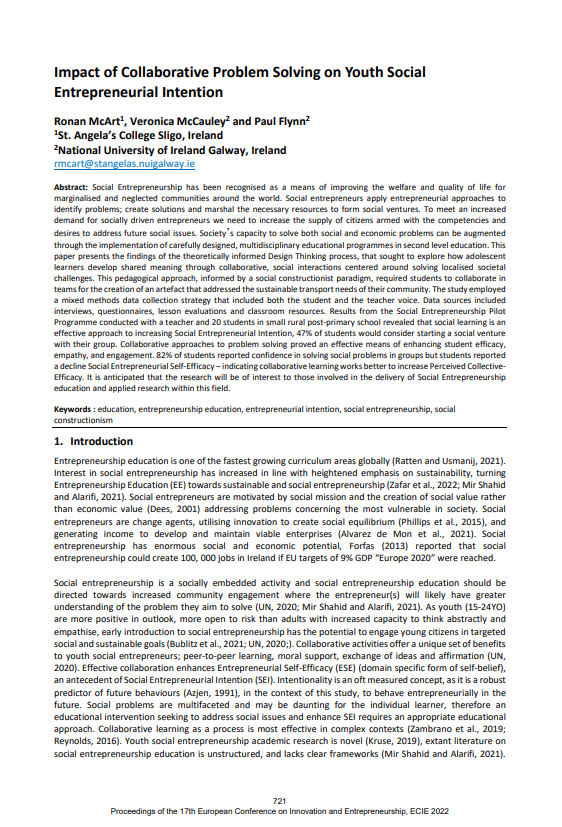¿En qué podemos ayudarte?
Impact of Collaborative Problem Solving on Youth Social Entrepreneurial Intention

Tipo: Artículo
Idioma: Inglés
Título:
Impact of Collaborative Problem Solving on Youth Social
Entrepreneurial Intention
Abstract
Social Entrepreneurship has been recognised as a means of improving the welfare and quality of life for marginalised and neglected communities around the world. Social entrepreneurs apply entrepreneurial approaches to identify problems; create solutions and marshal the necessary resources to form social ventures. To meet an increased demand for socially driven entrepreneurs we need to increase the supply of citizens armed with the competencies and desires to address future social issues. Society ’s capacity to solve both social and economic problems can be augmented through the implementation of carefully designed, multidisciplinary educational programmes in second level education. This paper presents the findings of the theoretically informed Design Thinking process, that sought to explore how adolescent learners develop shared meaning through collaborative, social interactions centered around solving localised societal challenges. This pedagogical approach, informed by a social constructionist paradigm, required students to collaborate in teams for the creation of an artefact that addressed the sustainable transport needs of their community. The study employed a mixed methods data collection strategy that included both the student and the teacher voice. Data sources included interviews, questionnaires, lesson evaluations and classroom resources. Results from the Social Entrepreneurship Pilot Programme conducted with a teacher and 20 students in small rural post-primary school revealed that social learning is an effective approach to increasing Social Entrepreneurial Intention, 47% of students would consider starting a social venture with their group. Collaborative approaches to problem solving proved an effective means of enhancing student efficacy, empathy, and engagement. 82% of students reported confidence in solving social problems in groups but students reported a decline Social Entrepreneurial Self-Efficacy – indicating collaborative learning works better to increase Perceived CollectiveEfficacy. It is anticipated that the research will be of interest to those involved in the delivery of Social Entrepreneurship education and applied research within this field.
Keywords: : education, entrepreneurship education, entrepreneurial intention, social entrepreneurship, social constructionism
Autores:
Ronan McArt
Veronica McCauley
Paul Flynn
Publicación:
Proceedings of the 17th European Conference on Innovation and Entrepreneurship, ECIE 2022
Año: 2022
Aportado por: José Carlos Sánchez García